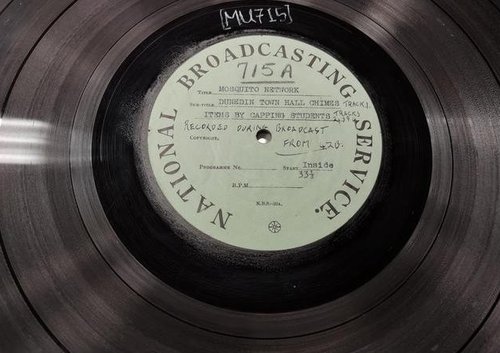
Research in the Sound Archives at Ngā Taonga Sound & Vision during New Zealand Music Month has confirmed a recording we hold of the iconic hit Blue Smoke, sung by the Otago University Capping Sextet in 1945, is now believed to be the oldest recorded version of the song.
Sarah Johnston is a regular guest on Afternoons with Jesse Mulligan on RNZ. Listen to her talk about this discovery and hear the song at 11min 42sec.
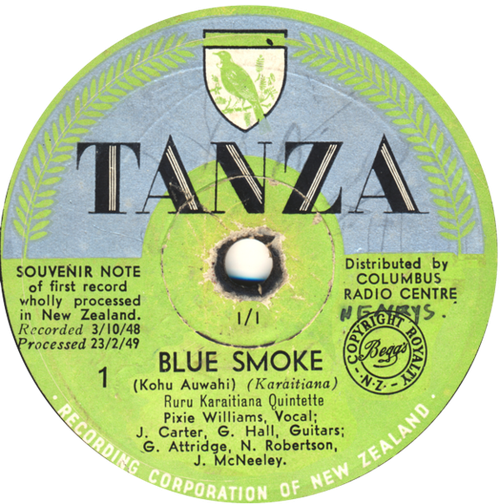
The original 1949 78 rpm label of Blue Smoke. Photo: AudioCulture.
If you’ve ever gone looking for something in a packed cupboard, or a big box in the garage, you’ll be familiar with the feeling of coming across something much more interesting than whatever you went looking for.
While researching material for the University of Otago’s 150th celebrations in the Ngā Taonga Archive, sound archivist Sarah Johnston stumbled upon an exciting taonga and something of great significance to New Zealand music history: the earliest known recording of the iconic song Blue Smoke.
Blue Smoke is iconic not just because it is a beautiful song whose popularity has endured for decades but because it was New Zealand’s very first home-grown hit – entirely written, recorded and produced in this country. Strictly speaking, it wasn’t actually written in New Zealand, but just offshore, as the song’s composer Ruru Karaitiana (Rangitāne, Ngāti Kahungunu) sailed from Aotearoa in 1940 with the (28) Māori Battalion to serve in World War Two. He noted the blue smoke from the ship’s funnel was drifting back towards home, as the men sailed further away, and the natural songwriter in him took it from there.
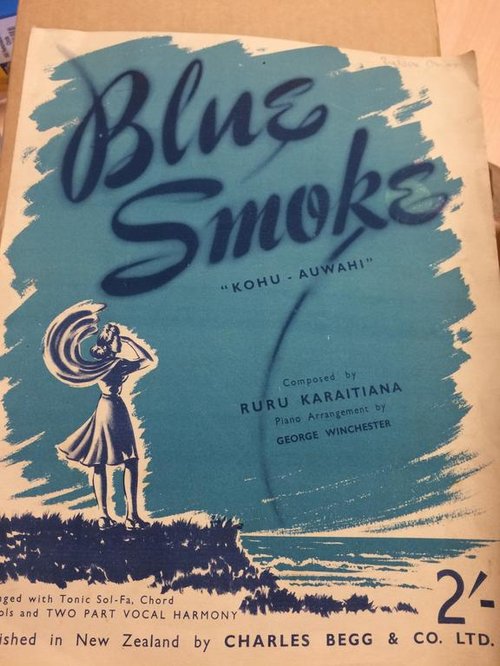
Blue Smoke sheet music, published in 1949. Photo: RNZ collection, Ngā Taonga Sound & Vision.
The lilting tune with its melancholy lyrics became a popular song with soldiers: there are accounts of it being sung overseas throughout the war by the Kiwis. But it was nearly a decade later in 1949 that the song finally had a commercial release on record. Until then New Zealand had no record-pressing plants. New Zealand artists had to go to Australia or beyond to make records or, on a couple of occasions, they were recorded here by visiting foreign record labels. Either way there was very little New Zealand content being released. You could make a private recording, but no one was pressing local discs to sell commercially.
When, at last, a record plant opened in New Zealand in 1949, Blue Smoke was the very first song to be pressed onto shellac and offered to the public on the TANZA label. Sung by Pixie Williams with the Ruru Karaitiana Quintette, it flew off the shelves along with the sheet music.
The song’s market was long-since primed since we know that Blue Smoke had made its way back to New Zealand during the war, probably in the pockets and memories of wounded soldiers sent home from the conflict. Ruru Karaitiana himself was shipped home wounded in 1943. Music historian Chris Bourke found mention of the song in wartime newspapers when he was researching his 2010 book Blue Smoke: The Lost Dawn of New Zealand Popular Music 1918 to 1964. As Bourke established, it was in a New Zealand National Broadcasting Service Mobile Unit truck in Hawera in 1946 that singer Jean Ngeru made what was previously thought to be the earliest recording of Blue Smoke, and there are other radio recordings from the late 40s.
But now, fast forward, or perhaps we should say ‘move the needle on to’ April 2019 and Sarah Johnston’s hunt for Otago University mementoes. A 16-inch acetate disc emerged from the Archives, labelled as a recording of an assembly at King’s High School in Dunedin. In his speech the Rector announces the death of Adolf Hitler. With archetypal rectorial authority he absolves anyone from guilt at rejoicing in the news of Hitler’s death.
That recording was made for broadcast on the ‘Mosquito Network’, temporary radio stations set up to entertain forces fighting in the Pacific. The New Zealand Broadcasting Service would record musical items and messages and send the discs to the Mosquito Network stations to play. Ngā Taonga holds quite a few of them, often recorded at High Schools. Adolf Hitler died on 30 April 1945 and that school assembly was 2 May 1945, just days before VE Day. So we can feel fairly safe in saying the other side of the disc would have been recorded around the same time.
The flip side is labelled ‘Mosquito Network; Dunedin Town Hall chimes; items by capping students. Recorded during broadcast from 4ZB.’ The Capping Concerts, held each year around Otago University graduation, were a big deal at the time and 4ZB, Dunedin’s commercial radio station then, evidently invited some of the performers into the studio to broadcast and record their performances.
It starts with three minutes of student comedy ‘banter’ that has not aged well – the sound quality is fine, it’s the humour that has deteriorated. Then the Otago Capping Band perform several musical items and finally, as the needle approaches the outside of the disc (they ran from centre to edge in those days), a male vocal group sings Blue Smoke – with piano accompaniment and a muted trumpet solo. It’s a sensitive and polished performance.
And so, unexpectedly, Sarah Johnston emerged from her metaphorical rummage in the loft with something on her hands that was much more than just another Capping Concert. Knowing that Pixie Williams’s record was not released until 1949, and after checking with Chris Bourke, she was able to confirm that this was definitely the earliest ever recording of Blue Smoke – predating Jean Ngeru’s version by a year.
A search of Papers Past produced an advertisement for a show at Dunedin’s Strand Theatre on 12 June 1945 featuring ‘the hit of the Capping Concert’, the Otago University Sextet, specifically mentioning Blue Smoke as a highlight of their performance. The Otago University Sextet is quite an institution, still in existence and celebrating its own centenary this year, and so we can be pretty certain that the 4ZB recording is by this group. The identities of the singers and musicians in 1945 are not known, and if anyone has any information that might help to put some names to the voices, we would love to hear from you.
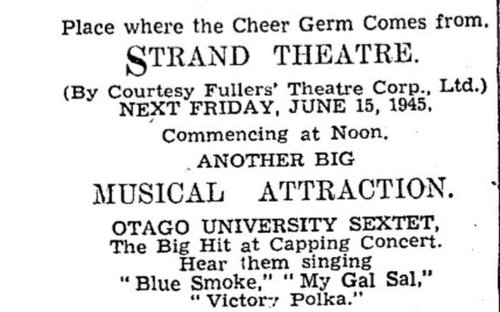
Otago Daily Times 12 June 1945, advertising the Otago Sextet singing Blue Smoke Photo: Courtesy Papers Past.
On reflection it’s rather unfair to describe Sarah’s delightful discovery as something more interesting than what she went looking for. Her brief was to find items of interest to and relevance to Otago University’s 150th anniversary. What she found was a notable contribution by the University and one of its oldest continuous, extra-curricular societies to New Zealand’s musical history.
And it also shows that the Archives of Ngā Taonga are quite the ‘box in the garage’ – giving up treasures for every New Zealander.
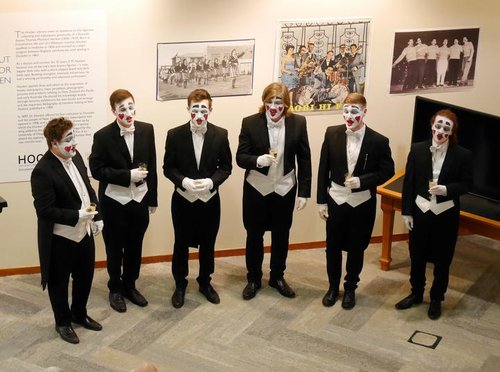
The 2019 Otago Capping Sextet at their 100th anniversary celebrations in May 2019. Photo: Amanda Mills, Hocken Collections.
Listen to Sarah’s other stories on RNZ Afternoons with Jesse Mulligan.